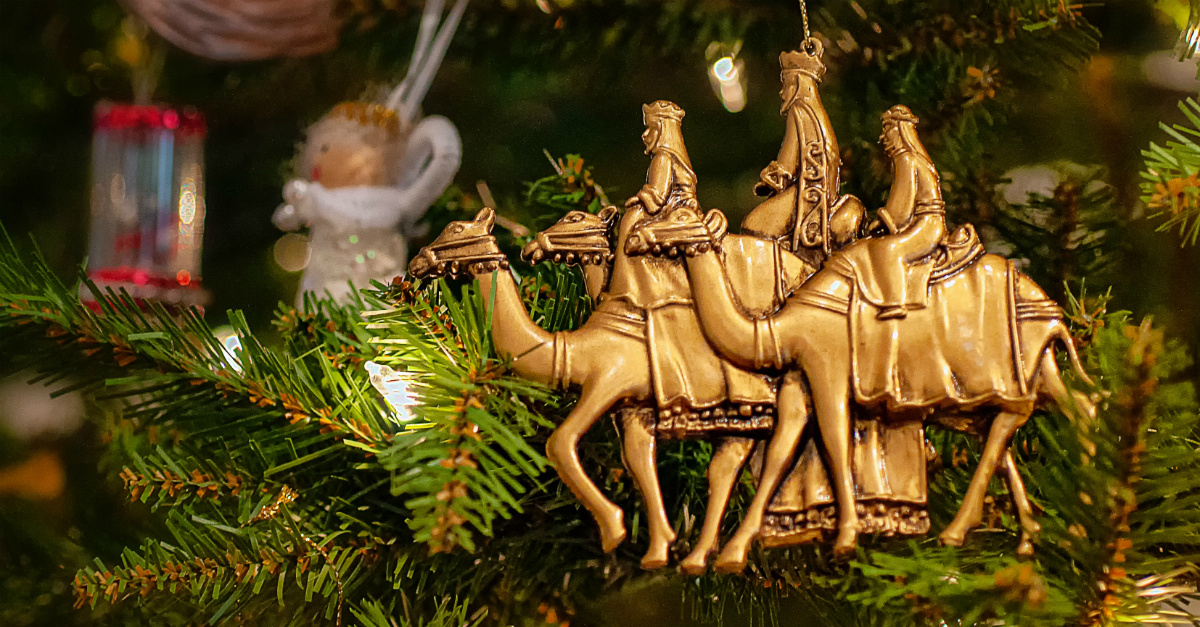
Is it worth it?
Christmas takes a lot out of us—the frenzied activity and financial strain, rushed trips, travel arrangements, credit card receipts, extra calories, jangled nerves.
Why does Christmas leave so many people exhausted and often depressed?
If that’s what Christmas does to you, perhaps something’s missing from your festivities. There's an emptiness in our culture that cries out for the joy of Christmas but seems incapable of receiving it. Somehow the bows, mistletoe, sugar cookies, and jingle bells no longer satisfy the heart.
There isn’t anything wrong with the original Christmas message, of course. The “good tidings of great joy” are as special now as then. The story of the Christ child—God-made man—is fully capable of satisfying the deepest needs of the human heart.
The problem is the human heart itself. Perhaps we can understand it better by looking at those curious characters in the Christmas story—the Wise Men.
Photo Credit: ©GettyImages/kevron2001
#1: Don’t Count on Affluence

The first thing we notice about them is their wealth. They appeared to have all the possessions one could imagine. While we don’t know if they were really kings, we do know they were wealthy enough to embark on long international trips, gain access to powerful rulers, and to bestow expensive presents. They are pictured on Christmas cards dressed in regal, royal garments, a caravan of camels in tow.
Yet despite their riches, they were still searching for something money couldn’t buy.
Think of it. They were willing to leave their comfortable lifestyles and affluent palaces with well-watered gardens by the Tigris and Euphrates Rivers to trek across a vast, barren desert in search of something that would fill the inner cravings of their souls.
Nothing has changed.
Many people work all their lives to develop a comfortable lifestyle only to find it strangely empty. Novelist Kathe Koja spoke of a “deep hole in the heart that cries for radiance.” During an interview, she said, “Our entire consumer culture is predicated on the belief that if you stuff enough things down that hole, you can finally satisfy it into silence. But this has never been the case.”
Lots of people give and receive hundreds of dollars’ worth of gifts during Christmas, only to be depressed on December 26. As one old Puritan put it, “The world is fading, not filling.”
Photo Credit: ©Getty Images/vasabii
#2: Don’t Count on Family Ties

The Magi descended from powerful families, but that didn’t satisfy them. Many experts believe the Magi were the descendants of the Babylonian wise men of biblical times, the people today known as the Kurds.
We first read of them in Daniel 2. The Babylonian King, Nebuchadnezzar, had a disturbing dream which none of his wise men—or Magi—could interpret. In a fit of wrath, Nebuchadnezzar ordered them all slain. But a young Hebrew prophet named Daniel intervened. God revealed to him the dream, and he explained it to the king. Daniel 2:48 says that Nebuchadnezzar “promoted Daniel and . . . made him . . . chief administrator over all the wise men of Babylon.”
It was undoubtedly Daniel’s influence that planted the seeds of Messianic hope within the Magi.
The Old Testament is full of predictions of His coming, and the Magi apparently knew some of those promises. They began looking for a Hebrew Messiah, the coming “King of the Jews.” Not having the full Hebrew Scriptures, the Magi looked for Him in the only place they knew—in the heavens, for they were astronomers. Rumors and yearnings for a coming King were passed from generation to generation until finally, hundreds of years later, they saw His star in the east and came to worship Him.
These men had a rich background, and their lineage gave them a high place in society. But it meant little to them. They needed the King of the Jews.
Perhaps you’re proud of your background, of your family history and genealogy. Maybe you were raised in a Christian home. Perhaps you grew up in church. Or maybe you’re proud of what you’ve achieved and of the name you’ve made for yourself.
It’s important to be thankful for our heritage and blessings; however, heritage and history don’t satisfy the heart, and the name we make for ourselves will one day be forgotten. But those who find Jesus have eternal hope springing up in their hearts. Nothing compares to that.
Photo Credit: ©GettyImages/Allanswart
#3: Don’t Count on Influence

The Magi were also powerful, influential men. Matthew 2 says their presence in Jerusalem deeply troubled King Herod and all the city. Their questions created panic in the palace. From that, we can safely assume they were accustomed to visiting with kings and dignitaries. They didn’t mind causing a stir. They were a respected group of leaders whose lifted eyebrow or ominous question could upset an entire nation.
But they were still hungry of heart.
The great Israeli statesman Abba Eban wrote in his autobiography about a conversation he once had with Edmund Hillary, the first man to climb Mount Everest. Eban asked Hillary what exactly he felt when he reached the peak. Hillary replied that the first sentiment was one of ecstatic accomplishment. But then there came a sense of desolation. What was there now left to do?
Jack Higgins, the renowned novelist, said that the one thing he learned at the high point in his career that he wished he had known as a small boy is this: “When you get to the top, there’s nothing there.”
People need the Lord. It isn’t power and influence we need—it’s Christ Himself. It’s a personal relationship with that Babe in the Manger.
Photo Credit: ©Getty Images/gorodenkoff
#4: Don’t Count on Faith Traditions

Finally, the Magi were religious men. They were, in fact, religious leaders. We call them “Wise Men” because they possessed the secrets of the mystery religions of the Orient, secrets handed down from the times of Daniel. Men and women throughout the eastern empires came to them, seeking answers to the questions of life.
But despite their piety and religion, these men had hollow hearts and empty souls.
And so they left home on their unexplainable mission, tramping through the desert, traveling for up to two years, trekking over “field and fountain, moor and mountain, following yonder star.”
O star of wonder, star of light,
Star with royal beauty bright,
Westward leading, still proceeding,
Guide us to thy perfect light.
They came to Christ. Their journey ended in Bethlehem where they found at last the real Christmas. Where wealth, heritage, power, and religion failed, there they found the Prince of Peace.
“And when they had come into the house, they saw the young Child with Mary His mother, and fell down and worshiped Him. And when they had opened their treasures, they presented gifts to Him: gold, frankincense, and myrrh.” (Matthew 2:11)
In Dorothy Sayers’ play, The Man Born to Be King, one of the wise men says, “Fear is our daily companion—fear of want, fear of war, fear of cruel death and still more cruel life. But all this we could bear if we knew that we did not suffer in vain. If we knew that God was beside us in the struggle, sharing the miseries of His own world.”
Do you feel that way? With all your affluence, family, influence, or traditions, are you still weary of heart this Christmas? Are you caught up in the boxes and bows, but somehow missing the Baby?
The Magi of two thousand years ago were willing to leave everything behind if only they might find Him who had been born a King.
Are you willing to leave everything to find and follow Christ? To take Him into your heart and home?
Then I have good tidings of great joy! Unto you is born this day in the city of David a Savior who is Christ the Lord.
Do you already know Christ? Then be a star this Christmas.
Just as the mysterious light of the East guided the Wise Men to Christ, we can guide others to the manger. We can invite them to Christmas services where the gospel is presented. We can bestow gifts of Christian literature and music. We can share Jesus by love, lip, and literature, being “children of God without fault in a crooked and depraved generation, in which you shine like stars in the universe as you hold out the word of life” (Philippians 2:15-16, NIV).
Let this be your mission this Christmas. And let Christ be your Guide.
Please visit DavidJeremiah.blog for more inspirational content from Dr. David Jeremiah.
Photo Credit: ©Unsplash/Robert Thiemann